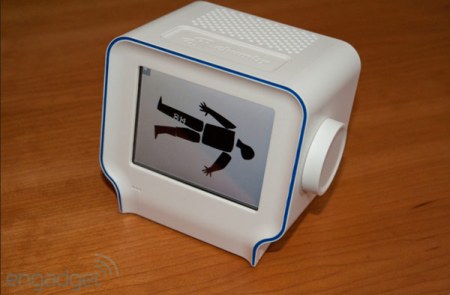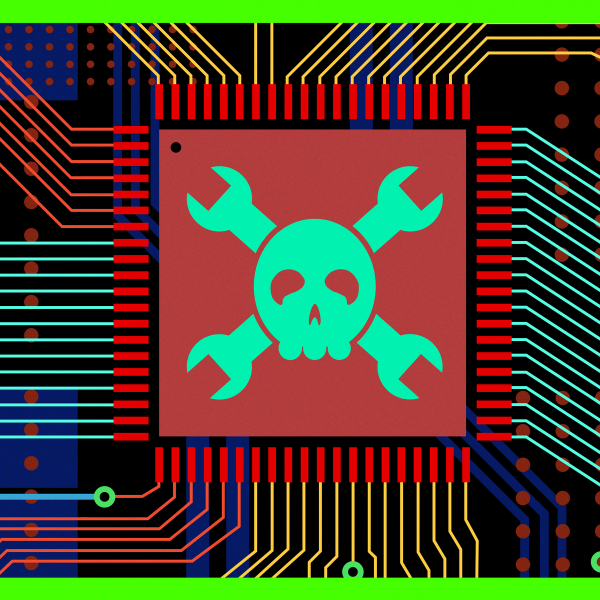
Hearing that Chumby will no longer be selling hardware makes us a little sad. We’ve seen this thing used for so many different things, like shooting people with missiles, spitting out composite video, web serving, stomping around bipedially, and being a 3g router. We knew it wouldn’t be long, since they actually stopped manufacturing last year, but we just couldn’t help but feel a tear come to our eye when it was officially announced. Let us all take a moment of silence.
















The biggest problem I’ve come across on the Chumby(and others) is the kernel support. It uses a really old kernel, no mainline support, and to patch it up to something more modern would be a PITA. If it were packing a kirkwood, wouldn’t be packed in a box somewhere…really, I have no idea where it is exactly.
The Chumby 8″ and Insignia Infocast 8″ DID have kirkwoods, and they are still a pain to patch to current kernels. I’ve been working off-and-on at getting 3.x to run on the silvermoon platform. Even the NeTV is a silvermoon(ish) device. 2.6.29 is just too old, and has so many changes to get to somewhere current. Ubuntu that runs on them is 9.0, which is officially abandoned, but was the only thing I’ve ever gotten to run reliably.
It’s actually technically possible to get linux-next working on a Silvermoon device. I got it running on an NeTV at one point, but it was a bit hampered as the SD driver didn’t work. My solution was to use a USB dongle as the root filesystem.
The biggest stumbling block is that the cpuid changed halfway through production. Silvermoon, by default, uses the old ID, whereas pxa168 code in the kernel assumes the new ID. You can modify the bootloader to run the “setid” command (as demonstrated in https://github.com/sutajiokousagi/u-boot-2009.07-silvermoon/blob/kovan/src/include/configs/aspenite.h#L204), or you can modify arch/arm/boot/compressed/head.S to always match for PXA168 and modify arch/arm/mach-mmp/include/mach/cputype.h and set it so cpu_is_pxa168() always returns 1.
That will at least get the kernek booting. I recommend turning on CONFIG_EARLY_PRINTK and adding “earlyprintk” to your command line, and eventually enabling kexec to make your life easier once you get to the point of hacking on drivers.
I love my chumby because it is almost the same spec for my first server on the internet back when domain names were free and usenet ruled.
Whats PITA and Kirkwood?
Anyway, i never liked it from the name to the look. It was ugly and didnt seem friendly enough if you ask me. But its always sad to see something end.
PITA = pain in the a$$
Kirkwood is another system alike, kind of minicomputer in a box
Well, soon the Olinuxino will be available, and itś quite close as hardware spec http://olimex.wordpress.com/2012/04/17/imx233-olinuxino-first-10-prototypes-are-ready/
It is using the same Freescale SoC, so still the old kernel, but is a bit cheaper than the Chumby hackerboard.
Still, should be one of the cheapest open hardware Linux running board.
Details of the Olinuxino are available at:
http://www.olinuxino.com
If they’re no longer selling the hardware does that mean they’re going to close down the apps website too?
Supposedly the widget servers are safe for now, but I wouldn’t expect them to last more than a year or so.
Zurk’s been working on an offline firmware, though.
http://forum.chumby.com/viewtopic.php?id=7831 for the Chumby One and Infocast 3.5″ devices, and http://forum.chumby.com/viewtopic.php?id=7832 for the Chumby8 and Infocast 8″ devices.
Aren’t the widgets reliant on the server even though they are stored locally?
They are, hence why I was saying the widget servers were safe for now. Poke around the Chumby forums, there’s scripts to dump your choice of widgets from their servers and host them locally on your Chumby.
Just one more thing that came and went without me having any personal experience with it at all. Nothing about it compelled me to make an extraordinary effort in regards to it.
I’m confused as to why you’d want one of their hackerboards now when the RasPi is coming to fruition, how much did those things cost anyway? All I seem to remember is saying to myself that I’d like a low power server, clicking a chumby link then recoiling at the cost. Ah well, shame to see it end of course but better devices will come to fill the hole it leaves.
Most hackers don’t want an oddball, artsy gadget. They want something sleek and unobtrusive.
And perhaps only the most lonely, or gullible, would want one that’s “huggable”; or consider it a friend in any other way than user-friendly. The rest are simply turned off by the marketing hype.
My first impression of the Chumby was “hideous and overpriced”. It stuck, and I never gave it a second glance.
Let Chumby be a lesson of what not to do in an already small market, that’s rapidly getting more crowded.
My Chumby One was buggy out of the box and it went down hill from there. In the end, it steadily refused to connect to my WiFi network and now I can’t get it to connect at all. The thing was really a PITA to work with – overall a horrible design from a software standpoint. The hardware design was brilliant however. It always amazed me how good the thing sounded. Someone really paid attention to the acoustic design aspects.
This has been coming for awhile. When Sony jumped ship with their line of DASH devices, I figured it wouldn’t be much longer before the Chumby ecosystem took a nosedive.
Bunnie Huang was at a paanel just friday talking about how Chumby was really a software company that happened to sell hardware. I never liked it because of the weak wifi reception
I put an external antenna on my Chumby One, and it now picks up WiFi no problem.
I’m sorry to see them go–it’s been my bedside alarm clock/home automation interface for over a year now.